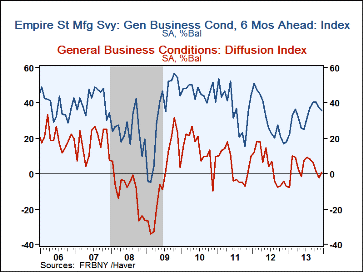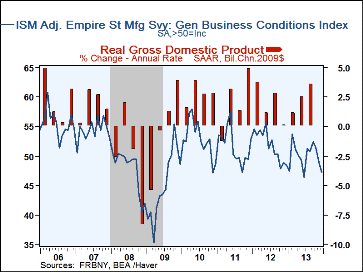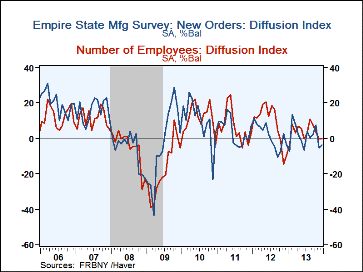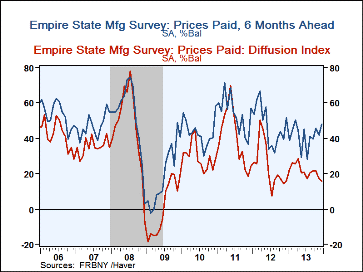 Global| Dec 16 2013
Global| Dec 16 2013Empire State Factory Index Is Disappointing
by:Tom Moeller
|in:Economy in Brief
Summary
The Federal Reserve Bank of New York reported that its Empire State Factory Index of General Business Conditions for December ticked up to 0.98 from an unrevised November reading of -2.21. The gain disappointed expectations for a [...]
The Federal Reserve Bank of New York reported that its Empire State Factory Index of General Business Conditions for December ticked up to 0.98 from an unrevised November reading of -2.21. The gain disappointed expectations for a level of 4.0, according to the Action Economics Forecast Survey. The full year reading also was disappointing as it slipped to 3.77 from 4.24 in 2012.
Based on these figures, Haver Analytics calculates a seasonally adjusted index that is compatible to the ISM series. The adjusted figure fell to 47.3, the second number below 50 since June and the lowest reading in six months. An improving level of activity is indicated by a figure above 50. Since inception in 2001, the business conditions index has a 63% correlation with the quarterly change in real GDP.
The slight December improvement in the overall index reflected gains in the shipments and new orders series. The employment reading remained at zero, its lowest level since June. During the last ten years there has been a 73% correlation between the jobs index and the m/m change in factory sector payrolls. To the downside were the inventories, unfilled orders and delivery times components.
Also deteriorating was the prices paid index to its lowest level since November 2012. A reduced 17 percent of respondents reported paying higher prices while 1 percent paid less. During the last ten years, there has been a 67% correlation between the index and the 3-month change in the intermediate goods PPI.
Looking ahead, the Empire State index of expected business conditions in six months fell to 35.72, its lowest level since July. Lower readings for new orders, shipments, employment, inventories, capital and technology expenditures dragged the total lower.
The Empire State figures are diffusion indexes which are calculated by subtracting the percent of respondents reporting poorer business conditions from those reporting improvement. Thus, they have a good correlation with growth in the series covered. The data is available in Haver's SURVEYS database. The ISM-adjusted headline index is calculated by Haver Analytics. The series date back only to 2001. The Consensus expectation figure is in Haver's AS1REPNA database.
| Empire State Manufacturing Survey | Dec | Nov | Oct | Dec'12 | 2013 | 2012 | 2011 |
|---|---|---|---|---|---|---|---|
| General Business Conditions (ISM Adjusted) | 47.3 | 48.9 | 51.4 | 48.5 | 50.0 | 51.8 | 51.8 |
| General Business Conditions (Diffusion Index, %) | 0.98 | -2.21 | 1.52 | -7.30 | 3.77 | 4.24 | 4.47 |
| New Orders | -3.54 | -5.53 | 7.75 | -3.44 | 1.14 | 1.38 | 4.04 |
| Shipments | 7.66 | -0.53 | 13.12 | 11.93 | 4.49 | 11.13 | 9.51 |
| Unfilled Orders | -24.10 | -17.11 | -6.02 | -6.45 | -8.74 | -8.83 | -5.29 |
| Delivery Time | -9.64 | -3.95 | -10.84 | -7.12 | -3.52 | -0.30 | -0.91 |
| Inventories | -21.69 | -1.32 | 0.00 | -11.83 | -5.73 | -2.91 | -1.80 |
| Number of Employees | 0.00 | 0.00 | 3.61 | -9.68 | 3.73 | 8.62 | 6.68 |
| Prices Paid | 15.66 | 17.11 | 21.69 | 16.13 | 21.53 | 24.71 | 40.66 |
Tom Moeller
AuthorMore in Author Profile »Prior to joining Haver Analytics in 2000, Mr. Moeller worked as the Economist at Chancellor Capital Management from 1985 to 1999. There, he developed comprehensive economic forecasts and interpreted economic data for equity and fixed income portfolio managers. Also at Chancellor, Mr. Moeller worked as an equity analyst and was responsible for researching and rating companies in the economically sensitive automobile and housing industries for investment in Chancellor’s equity portfolio. Prior to joining Chancellor, Mr. Moeller was an Economist at Citibank from 1979 to 1984. He also analyzed pricing behavior in the metals industry for the Council on Wage and Price Stability in Washington, D.C. In 1999, Mr. Moeller received the award for most accurate forecast from the Forecasters' Club of New York. From 1990 to 1992 he was President of the New York Association for Business Economists. Mr. Moeller earned an M.B.A. in Finance from Fordham University, where he graduated in 1987. He holds a Bachelor of Arts in Economics from George Washington University.










